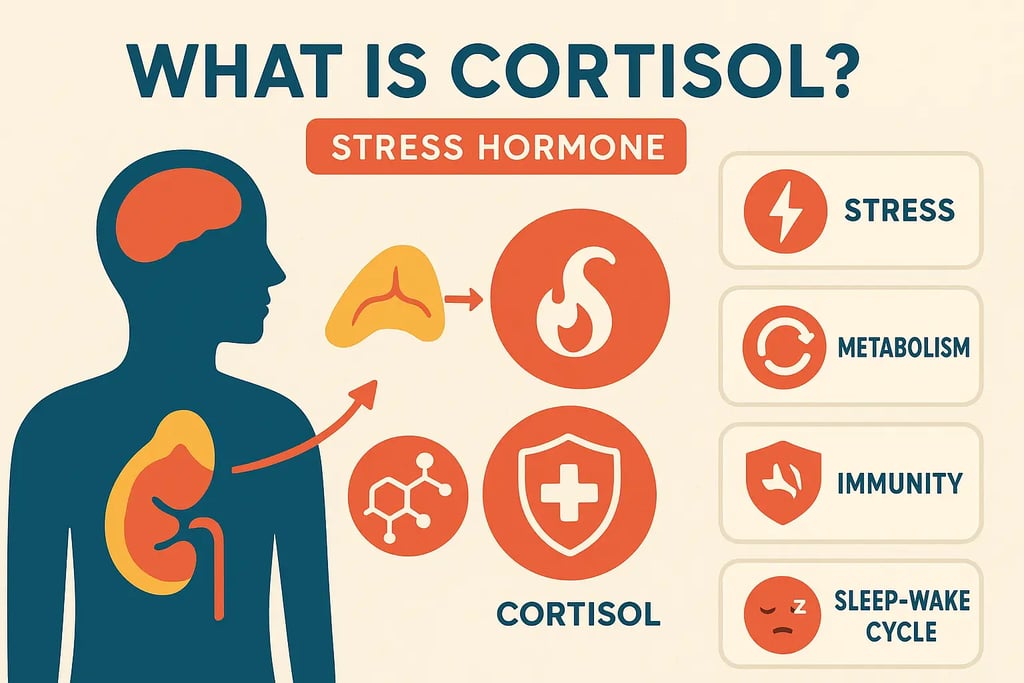What is Cortisol? Functions, Sources, and Role in Stress Management
Learn what cortisol is, how it’s produced, and why it’s called the “stress hormone.” Discover its key functions, effects on metabolism and immunity, and how cortisol imbalances impact health.


What is Cortisol? Understanding the Body’s Primary Stress Hormone
Cortisol, commonly known as the “stress hormone,” is a vital steroid hormone that plays a key role in the body’s stress response and overall homeostasis. Belonging to the glucocorticoid class of hormones, cortisol is synthesized from cholesterol in the adrenal glands—small, triangular organs located just above the kidneys.
The production and release of cortisol are regulated by the hypothalamic-pituitary-adrenal (HPA) axis, a complex system involving the hypothalamus, pituitary gland, and adrenal glands. When the body encounters physical or emotional stress, the hypothalamus releases corticotropin-releasing hormone (CRH), which signals the pituitary gland to secrete adrenocorticotropic hormone (ACTH). ACTH then stimulates the adrenal glands to release cortisol into the bloodstream.
Cortisol’s primary function is to help the body manage stress by mobilizing energy, modulating inflammation, and regulating metabolism. It influences how the body utilizes carbohydrates, fats, and proteins, maintains blood pressure, and contributes to a stable sleep-wake cycle.
Under normal conditions, cortisol levels follow a diurnal rhythm, peaking in the early morning to prepare the body for the day and gradually declining toward nightfall. However, during prolonged stress, cortisol levels can remain elevated, potentially leading to hormonal imbalances and health issues. Despite its association with stress, cortisol is essential for maintaining energy balance and supporting vital bodily functions.
Where is Cortisol Found in the Body?
Cortisol is produced in the adrenal cortex and is distributed throughout the body via the bloodstream. Its widespread presence enables it to influence various tissues and organs, including the liver, muscles, fat cells, and immune system.
Once released, cortisol binds to specific glucocorticoid receptors within cells. This interaction triggers a range of cellular responses—such as glucose production in the liver or protein breakdown in muscles—helping the body maintain energy balance and manage stress effectively.
Cortisol can also be detected in saliva, hair, and blood samples, which allows researchers and healthcare professionals to assess both short-term and long-term stress levels.
Salivary cortisol tests provide insights into daily fluctuations and circadian patterns.
Hair cortisol analysis reflects chronic stress exposure over several months.
Maintaining balanced cortisol levels is essential. Excess cortisol may lead to conditions like Cushing’s syndrome, characterized by rapid weight gain and high blood pressure, whereas low cortisol levels may cause Addison’s disease, marked by fatigue, low blood pressure, and weight loss.
Key Functions of Cortisol in the Human Body
Cortisol influences nearly every major system in the human body. Below are its primary functions:
1. Stress Regulation
During stressful situations, cortisol initiates the fight-or-flight response, ensuring quick access to energy. It increases glucose availability, suppresses non-essential bodily functions, and prepares the body to respond to challenges.
2. Metabolic Control
Cortisol regulates metabolism by:
Promoting gluconeogenesis (the creation of glucose from non-carbohydrate sources).
Facilitating fat storage and breakdown, especially in the abdomen.
Encouraging protein catabolism, providing amino acids for energy production.
While these functions are vital for short-term survival, chronic high cortisol can lead to weight gain, insulin resistance, and muscle loss.
3. Immune System Modulation
Cortisol’s anti-inflammatory properties help prevent overactive immune responses. It reduces inflammation and helps the body recover from infections, but consistently high cortisol can suppress immunity, increasing vulnerability to illnesses.
4. Sleep-Wake Cycle Maintenance
Cortisol follows a circadian rhythm, peaking in the morning to help you wake up and dropping at night to promote restful sleep. This natural rhythm supports mental clarity, energy balance, and hormonal stability.
Health Implications of Cortisol Imbalance
An imbalance in cortisol production can lead to serious health issues:
High Cortisol (Cushing’s Syndrome): Causes rapid weight gain, high blood sugar, mood swings, and hypertension.
Low Cortisol (Addison’s Disease): Leads to fatigue, muscle weakness, and low blood pressure.
Managing stress through balanced nutrition, regular exercise, adequate sleep, and relaxation techniques is crucial for maintaining healthy cortisol levels and overall wellbeing.
Conclusion
Cortisol is far more than just a stress hormone—it’s a master regulator of metabolism, immunity, and energy balance. While short-term spikes in cortisol are beneficial for coping with stress, chronic elevation can disrupt the body’s harmony. Understanding how cortisol functions and maintaining its balance through healthy lifestyle habits is essential for optimal physical and mental health.
